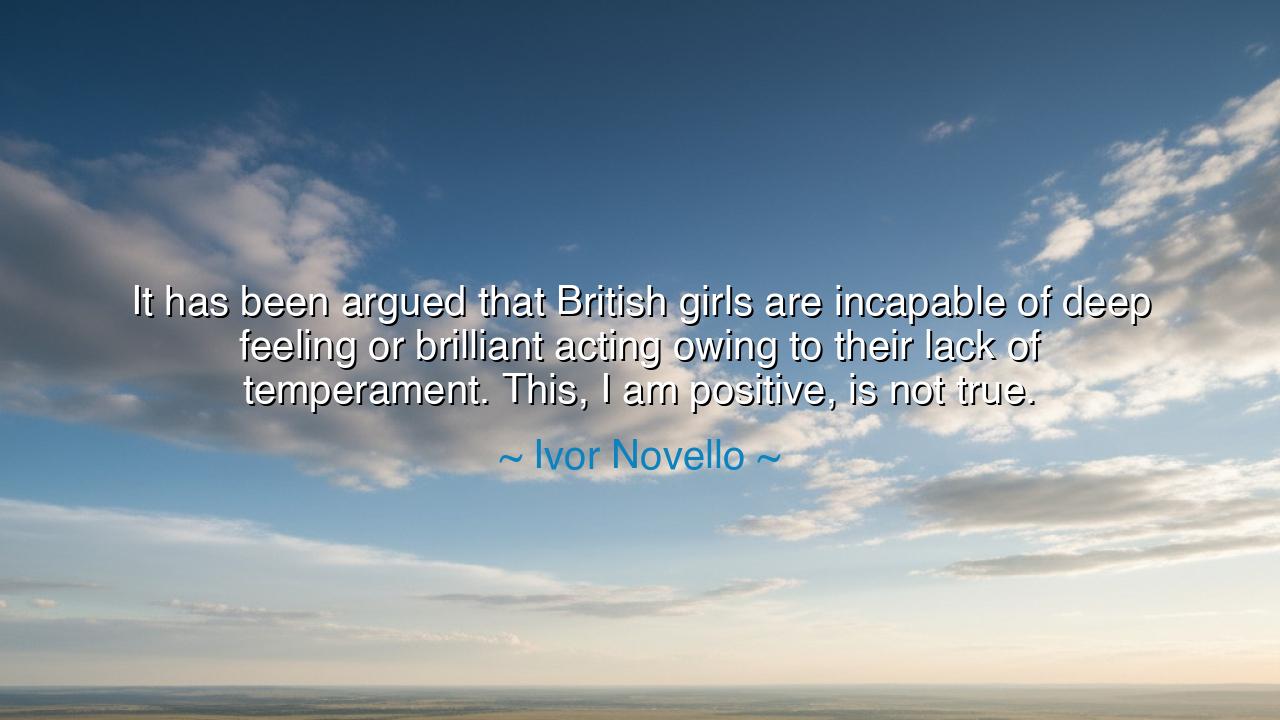
It has been argued that British girls are incapable of deep
It has been argued that British girls are incapable of deep feeling or brilliant acting owing to their lack of temperament. This, I am positive, is not true.






The words of Ivor Novello — “It has been argued that British girls are incapable of deep feeling or brilliant acting owing to their lack of temperament. This, I am positive, is not true.” — are a defense of dignity against the scorn of stereotype. They remind us that the soul of artistry is not bound by nation or gender, but by the fire of spirit within. To dismiss a people as incapable of greatness is to deny the boundless nature of human genius, which rises in the most unexpected places.
The claim that British girls lacked temperament reflects an old prejudice, one that confused restraint for coldness. Where passion was loud and fiery, some mistook it as the only measure of deep feeling. Yet Novello, himself an artist of stage and song, bore witness to the quiet power that lies in subtlety. He declares with certainty — “I am positive” — that their artistry was not less, but different: a flame not raging like a tempest, but glowing steady like a hearth, warm and enduring.
History offers many refutations of such narrow views. Consider Sarah Siddons, the great tragedienne of the 18th century, whose portrayals of Lady Macbeth and other heroines filled theaters with awe. None who watched her could claim she lacked deep feeling; her art struck audiences like thunder, yet with precision and grace. Or Vivien Leigh, whose strength and vulnerability in roles like Scarlett O’Hara and Blanche DuBois revealed that brilliance is not chained to the soil of Italy or France, but flourishes also in Britain’s daughters.
The accusation of lacking temperament is in truth a misunderstanding of cultural character. The British tradition often valued composure, discipline, and understatement. Yet these qualities, far from weakness, could sharpen performance into something distinct: an art that pierces not with excess, but with restraint. Novello saw what others missed — that within these women, as within all artists, burned the same eternal fires of joy, grief, and passion, awaiting the stage to be revealed.
Let the generations learn: never accept the claim that genius belongs only to certain nations or temperaments. Brilliant acting and deep feeling are treasures of the human spirit, not the inheritance of a single people. Ivor Novello’s words are thus both defense and prophecy: that the greatness of British girls would shine, not in imitation of others, but in the authenticity of their own voices. And so he charges us to believe, against prejudice, that genius knows no boundaries, and that the stage belongs to all who dare to feel.






VKHo Van Khanh
I think Ivor Novello’s statement is an important reminder of how harmful stereotypes can limit people’s potential. It raises the question of how far we've come in breaking down these outdated views, especially in fields like acting where emotional range is so crucial. What steps can we take to ensure that people’s talents are recognized regardless of nationality or perceived temperament?
NCToan Nguyen cong
The idea that a lack of 'temperament' could limit someone’s emotional depth or acting ability seems absurd. Do you think there’s an ongoing cultural bias that affects the way British actresses are perceived, especially when compared to their counterparts in other parts of the world? How can we address such biases and promote more inclusive standards?
ATThi anh Truong
I appreciate that Ivor Novello challenges this stereotype, but I wonder—do these kinds of assumptions still exist today, and if so, how do they influence the careers of young actresses or performers from different cultural backgrounds? Are we moving past these limiting views, or is the arts industry still grappling with them?
PPPhan PT
It’s interesting that Ivor Novello pushes back against the notion that British girls lack temperament. In my opinion, every individual has a unique emotional depth and capacity for expression. How do you think such generalized beliefs impact the way women are perceived in the arts, especially when it comes to acting?
NNNguyen nhat nam
This quote touches on a very outdated and problematic stereotype about British women. The idea that a whole group of people could be incapable of deep feeling or acting due to temperament is both dismissive and limiting. How can we challenge these kinds of stereotypes in a way that promotes individuality rather than generalizing based on nationality or gender?